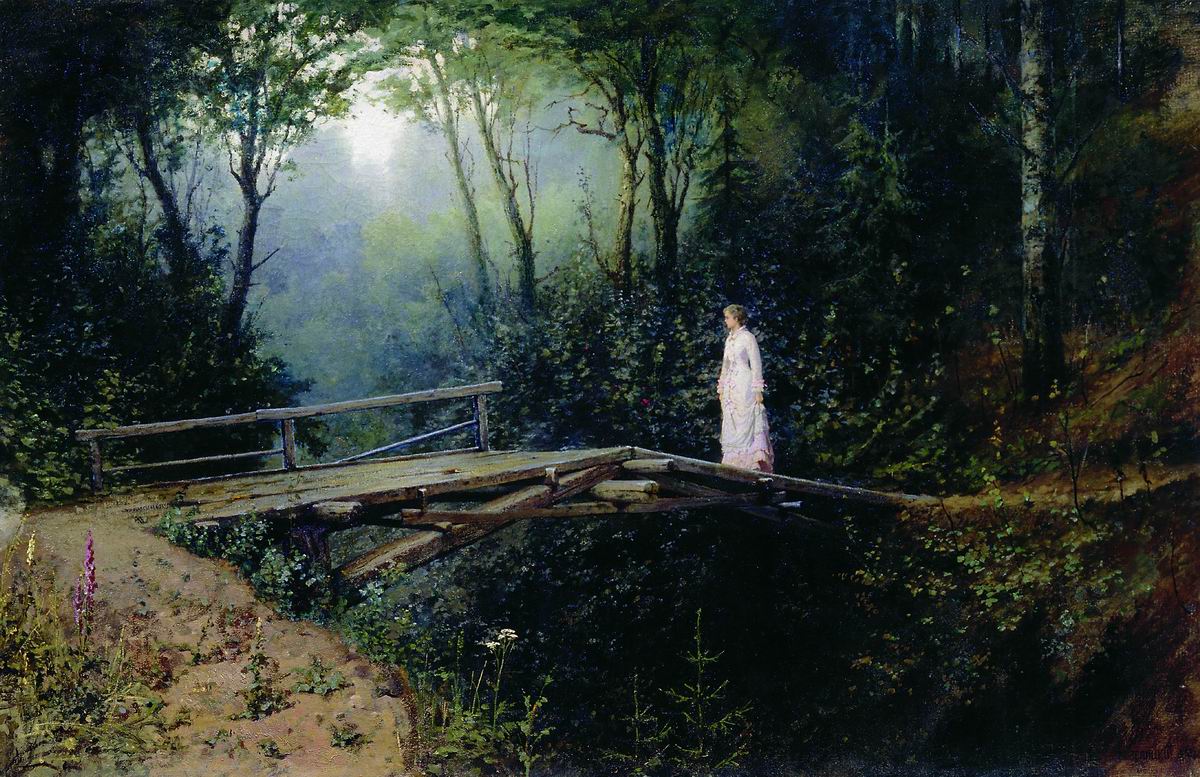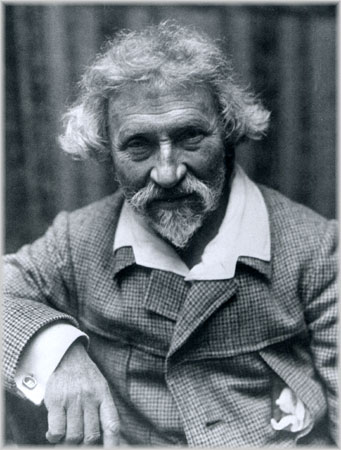|
Rafail Levitsky
Rafail Sergeevich Levitsky (or Rafael Sergeevich Levitsky, or Raphael Sergeevich Levitsky; russian: –†–į—Ą–į–łŐĀ–Ľ –°–Ķ—Ä–≥–Ķ–ĶŐĀ–≤–ł—á –õ–Ķ–≤–łŐĀ—Ü–ļ–ł–Ļ; 1847‚Äď1940) was a Russian Empire and Soviet genre, romantic, and impressionist artist who was an active participant in the Peredvizhniki (Itinerant) Movement. His letters to his artist friend Vasily Dmitrievich Polenov 1844-1927 are a personal account of many of the key figures in Russian art who exhibited during their lifetime. Rafail was born into a wealthy aristocratic family. He was married to Anna Vasilevna Olsufevsky. He was the second cousin of Aleksandr Ivanovich Herzen (1812‚Äď1870), the writer and outstanding public figure; and son to Count Sergei Lvovich Levitsky (1819‚Äď1898), one of the founders of photography in Russia and Europe's early photographic pioneers. He was friend to author Count Lev Nikolayevich Tolstoy (1828‚Äď1910) who visited and stayed with him and his wife on several occasions. Rafail Lev ... [...More Info...] [...Related Items...] OR: [Wikipedia] [Google] [Baidu] |
Russian Empire
The Russian Empire was an empire and the final period of the Russian monarchy from 1721 to 1917, ruling across large parts of Eurasia. It succeeded the Tsardom of Russia following the Treaty of Nystad, which ended the Great Northern War. The rise of the Russian Empire coincided with the decline of neighbouring rival powers: the Swedish Empire, the Polish‚ÄďLithuanian Commonwealth, Qajar Iran, the Ottoman Empire, and Qing China. It also held colonies in North America between 1799 and 1867. Covering an area of approximately , it remains the third-largest empire in history, surpassed only by the British Empire and the Mongol Empire; it ruled over a population of 125.6 million people per the 1897 Russian census, which was the only census carried out during the entire imperial period. Owing to its geographic extent across three continents at its peak, it featured great ethnic, linguistic, religious, and economic diversity. From the 10th‚Äď17th centuries, the land ... [...More Info...] [...Related Items...] OR: [Wikipedia] [Google] [Baidu] |
Nikolai Nekrasov
Nikolay Alexeyevich Nekrasov ( rus, –Ě–ł–ļ–ĺ–Ľ–įŐĀ–Ļ –ź–Ľ–Ķ–ļ—Ā–ĶŐĀ–Ķ–≤–ł—á –Ě–Ķ–ļ—Ä–įŐĀ—Ā–ĺ–≤, p=n ≤…™k…źňąlaj …źl ≤…™kňąs ≤ej…™v ≤…™t…ē n ≤…™ňąkras…ôf, a=Ru-Nikolay_Alexeyevich_Nekrasov.ogg, ‚Äď ) was a Russian poet, writer, critic and publisher, whose deeply compassionate poems about the Russian peasantry made him a hero of liberal and radical circles in the Russian intelligentsia of the mid-nineteenth century, particularly as represented by Vissarion Belinsky and Nikolay Chernyshevsky. He is credited with introducing into Russian poetry ternary meters and the technique of dramatic monologue (''On the Road'', 1845). As the editor of several literary journals, notably ''Sovremennik'', Nekrasov was also singularly successful and influential. Biography Early years Nikolay Alexeyevich Nekrasov was born in Nemyriv (now in Vinnytsia Oblast, Ukraine), in the Bratslavsky Uyezd of Podolia Governorate. His father Alexey Sergeyevich Nekrasov (1788-1862) was a descendant from Russian l ... [...More Info...] [...Related Items...] OR: [Wikipedia] [Google] [Baidu] |
Czar Nicholas Alexandra Olga
Tsar ( or ), also spelled ''czar'', ''tzar'', or ''csar'', is a title used by East and South Slavic monarchs. The term is derived from the Latin word ''caesar'', which was intended to mean "emperor" in the European medieval sense of the term‚ÄĒa ruler with the same rank as a Roman emperor, holding it by the approval of another emperor or a supreme ecclesiastical official (the Pope or the Ecumenical Patriarch)‚ÄĒbut was usually considered by western Europeans to be equivalent to "king". It lends its name to a system of government, tsarist autocracy or tsarism. "Tsar" and its variants were the official titles of the following states: * Bulgarian Empire (First Bulgarian Empire in 681‚Äď1018, Second Bulgarian Empire in 1185‚Äď1396), and also used in Tsardom of Bulgaria, in 1908‚Äď1946 * Serbian Empire, in 1346‚Äď1371 * Tsardom of Russia, in 1547‚Äď1721 (replaced in 1721 by ''imperator'' in Russian Empire, but still remaining in use, also officially in relation to several regi ... [...More Info...] [...Related Items...] OR: [Wikipedia] [Google] [Baidu] |
Rose Strunsky Lorwin
Rose Strunsky Lorwin (1884, Russia ‚Äď 1963, New York City) was a Jewish Russian-American translator and socialist based in New York City. Early life and education Rose Strunsky was born to a Jewish Russian family in what is now Belarus and was part of the Russian Empire. She had older siblings Anna Strunsky and Max. In 1886 her family emigrated by ship to the United States, settling in New York City. The sisters learned English and attended public schools. After several years the family moved to San Francisco, where they lived with her older brother, Dr. Max Strunsky, who had become a physician. Like her older sister Anna Strunsky, Rose attended Stanford University. Activist career Rose and Anna became active in socialist politics and San Francisco's literary scene, where they were members of "The Crowd", which included writer Jack London. In 1905 the sisters travelled together in Russia as correspondents for William English Walling, an American socialist who had a revolutionary ... [...More Info...] [...Related Items...] OR: [Wikipedia] [Google] [Baidu] |
Ilya Tolstoy
Count Ilya Lvovich Tolstoy (; 22 May 1866 ‚Äď 11 December 1933) was a Russian writer, and the third child and second son of Leo Tolstoy. Early life Ilya was born at Yasnaya Polyana and spent most of his young life there, until the family took a house in Moscow in 1881. He received his early education at home; his mother taught him to read and write, first in Russian, and later in French and English, and his father taught him mathematics, and later Greek and Latin. He and his siblings were also schooled by private tutors.Tolstoy, Ilya ''Reminiscences of Tolstoy''. New York: Century Company, 1914. Leo Tolstoy, in an 1872 letter to his father's cousin Alexandra Andreyevna Tolstaya, described his children; he said the following of his son Ilya: Ilya, the third, has never been ill in his life; broad-boned, white and pink, radiant, bad at lessons. Is always thinking about what he is told not to think about. Invents his own games. Hot-tempered and violent, wants to fight at once; bu ... [...More Info...] [...Related Items...] OR: [Wikipedia] [Google] [Baidu] |
Henryk Sienkiewicz
Henryk Adam Aleksander Pius Sienkiewicz ( , ; 5 May 1846 ‚Äď 15 November 1916), also known by the pseudonym Litwos (), was a Polish writer, novelist, journalist and Nobel Prize laureate. He is best remembered for his historical novels, especially for his internationally known best-seller ''Quo Vadis'' (1896). Born into an impoverished Polish noble family in Russian-ruled Congress Poland, in the late 1860s he began publishing journalistic and literary pieces. In the late 1870s he traveled to the United States, sending back travel essays that won him popularity with Polish readers. In the 1880s he began serializing novels that further increased his popularity. He soon became one of the most popular Polish writers of the turn of the 19th and 20th centuries, and numerous translations gained him international renown, culminating in his receipt of the 1905 Nobel Prize in Literature for his "outstanding merits as an epic writer." Many of his novels remain in print. In Poland he is ... [...More Info...] [...Related Items...] OR: [Wikipedia] [Google] [Baidu] |
Savva Mamontov
Savva Ivanovich Mamontov (russian: –°–įŐĀ–≤–≤–į –ė–≤–įŐĀ–Ĺ–ĺ–≤–ł—á –ú–įŐĀ–ľ–ĺ–Ĺ—ā–ĺ–≤, ; 3 October 1841 (15 October N.S.), Yalutorovsk ‚Äď 6 April 1918, Moscow) was a Russian industrialist, merchant, entrepreneur and patron of the arts. Business career He was a son of the wealthy merchant and industrialist Ivan Feodorovich Mamontov and Maria Tikhonovna (Lakhitina). In 1841, the family moved to Moscow. From 1852, he studied in St. Petersburg, and later at the Moscow University. In 1862 his father sent him to Baku to engage in business with the elder Mamontov's Trans-Caspian Trade Partnership. In 1864, Savva visited Italy where he began to take lessons in singing. There he was introduced to the daughter of Moscow merchant Grigory Sapozhnikov, 17-year-old Elizabeth, who subsequently became his wife. The wedding took place in 1865 at the Kireevo estate, near Khimki, just northwest of Moscow. Upon his father's death in 1869, he succeeded to his share in the Moscow-Yaroslavl Rail ... [...More Info...] [...Related Items...] OR: [Wikipedia] [Google] [Baidu] |
Abramtsevo Colony
Abramtsevo (russian: –ź–Ī—Ä–įŐĀ–ľ—Ü–Ķ–≤–ĺ) is a former country estate and now museum-reserve located north of Moscow, in the proximity of Khotkovo, that became a centre for the Slavophile movement and an artists' colony in the 19th century. The estate is located in the village of Abramtsevo, in Sergiyevo-Posadsky District of Moscow Oblast. The Abramtsevo Museum-reserve site is an object of cultural heritage in Russia. History Originally owned by the author Sergei Aksakov, other writers and artists ‚ÄĒ such as Nikolai Gogol ‚ÄĒ at first came there as his guests. Under Aksakov, visitors to the estate discussed ways of ridding Russian art of Western influences to revive a purely national style. In 1870, eleven years after Aksakov's death, it was purchased by Savva Mamontov, a wealthy industrialist and patron of the arts. Under Mamontov, Russian themes and folk art flourished there. During the 1870s and 1880s, Abramtsevo hosted a colony of artists who sought to recapture the quali ... [...More Info...] [...Related Items...] OR: [Wikipedia] [Google] [Baidu] |
Ilya Repin
Ilya Yefimovich Repin (russian: –ė–Ľ—Ć—Ź –ē—Ą–ł–ľ–ĺ–≤–ł—á –†–Ķ–Ņ–ł–Ĺ, translit=Il'ya Yefimovich Repin, p=ňąr ≤ep ≤…™n); fi, Ilja JefimovitŇ° Repin ( ‚Äď 29 September 1930) was a Russian painter, born in what is now Ukraine. He became one of the most renowned artists in Russia during the 19th century. His major works include ''Barge Haulers on the Volga'' (1873), '' Religious Procession in Kursk Province'' (1880‚Äď1883), ''Ivan the Terrible and His Son Ivan'' (1885); and ''Reply of the Zaporozhian Cossacks'' (1880‚Äď1891). He is also known for the revealing portraits he made of the leading literary and artistic figures of his time, including Mikhail Glinka, Modest Mussorgsky, Pavel Tretyakov and especially Leo Tolstoy, with whom he had a long friendship. Repin was born in Chuguyev, in Kharkov Governorate of the Russian Empire. His father had served in an Uhlan Regiment in the Russian army, and then sold horses. Repin began painting icons at age sixteen. He failed at his first ... [...More Info...] [...Related Items...] OR: [Wikipedia] [Google] [Baidu] |
Repin Sketch
Repin (russian: –†–ĶŐĀ–Ņ–ł–Ĺ; masculine) or Repina (; feminine) is a Russian last name. It is derived from the sobriquet ''"—Ä–Ķ–Ņ–į"'' ("turnip") and may refer to the following people: *Ilya Repin (1844‚Äď1930), Ukrainian and Russian painter * Nikolay Repin (b. 1932), Soviet painter *Vadim Repin (b. 1971), Russian violinist Archaeology *The Repin culture, the first phase (or, depending on the author, the forerunner) of the Pit Grave/Ochre Grave/Yamnaya culture. Other uses *Ňėep√≠n, a village and municipality of the Czech Republic. * 2468 Repin, a Main-belt Asteroid named after Ilya Repin. See also *Repino Repino (russian: –†–Ķ–Ņ–ł–Ĺ–ĺ) is the name of several inhabited localities in Russia. Modern localities ;Urban localities * Repino, Saint Petersburg, a municipal settlement in Kurortny District of the federal city of St. Petersburg ;Rural ..., several inhabited localities in Russia {{Disambiguation, surname Russian-language surnames ... [...More Info...] [...Related Items...] OR: [Wikipedia] [Google] [Baidu] |
View Of Mazzolada Di Lison, Veneto, Italy
A view is a sight or prospect or the ability to see or be seen from a particular place. View, views or Views may also refer to: Common meanings * View (Buddhism), a charged interpretation of experience which intensely shapes and affects thought, sensation, and action * Graphical projection in a technical drawing or schematic ** Multiview orthographic projection, standardizing 2D images to represent a 3D object * Opinion, a belief about subjective matters * Page view, a visit to a World Wide Web page * Panorama, a wide-angle view * Scenic viewpoint, an elevated location where people can view scenery * World view, the fundamental cognitive orientation of an individual or society encompassing the entirety of the individual or society's knowledge and point-of-view Places * View, Kentucky, an unincorporated community in Crittenden County * View, Texas, an unincorporated community in Taylor County Arts, entertainment, and media Music * ''View'' (album), the 2003 debut album by ... [...More Info...] [...Related Items...] OR: [Wikipedia] [Google] [Baidu] |







